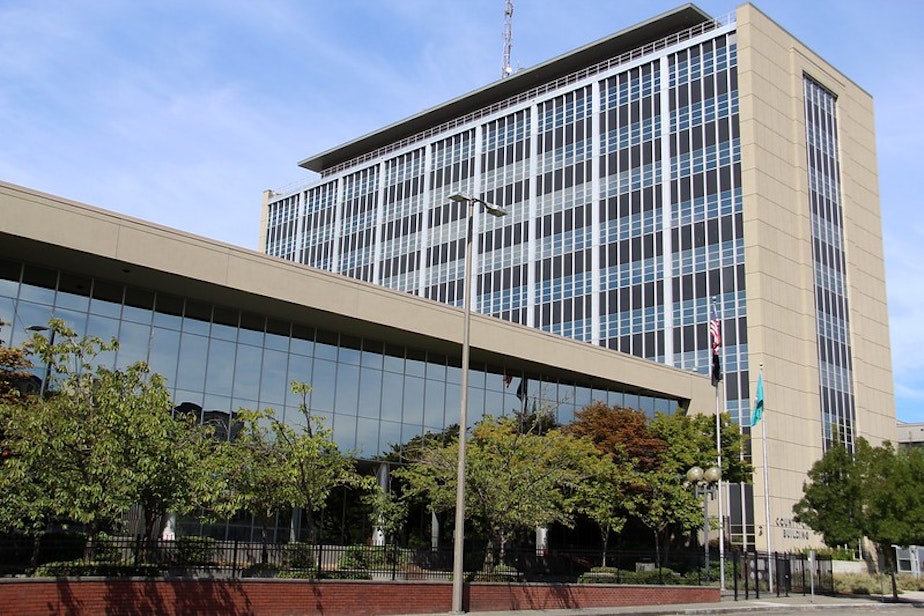Washington counties sue DSHS, protesting release of 200 patients

A majority of counties in Washington say the state Department of Social and Health Services is creating risks to public safety and to mentally ill people by abruptly releasing them from state care. The 22 counties have filed a lawsuit in Pierce County Superior Court.
A hearing may take place as early as Sept. 8.
The lawsuit seeks to force DSHS to abide by public notice obligations when releasing patients previously charged with crimes, and to evaluate people whose felony charges are dismissed because they are deemed incompetent to stand trial, rather than putting that responsibility on counties.
While a federal judge ordered DSHS to offer more beds to serve people who are currently incarcerated, county officials said that doesn’t mean DSHS can steer this other complex population of people into their already overburdened systems.
DSHS issued a statement in response to the lawsuit Wednesday in which it said, "This new bout of litigation brought forward today by the counties is in direct conflict with the federal court’s order." (See the full statement below).
The counties’ lawsuit also alleges that state officials violated public notice rules. That’s as the state prepares to release more than 200 state hospital patients by Sept. 7. Those patients were previously charged with felony crimes — the charges were dropped when those patients were deemed not competent to stand trial.
Sponsored
Isabel Jones heads King County’s behavioral health and recovery services. She said 45 of the patients being discharged are from King County, and one of them has already been released to a homeless shelter.
“These are complex clients, it is not always quick to be able to find an appropriate placement,” Jones said.
David Hackett, general counsel for King County Executive Dow Constantine, said instead of notifying local law enforcement or crime victims about these releases, DSHS sent a more general letter to the Washington Association of Sheriffs and Police Chiefs.
“Essentially they’ve said, 'We’re going to release a bunch of unnamed people by Sept. 7.' Counties received a slightly more specific letter, only in that it had some names attached to it, but no details,” Hackett said.
Eric Johnson is the executive director for the Washington State Association of Counties, which also joined the lawsuit. He said it is highly unusual for this many counties to come together so quickly to file a lawsuit, but this issue is urgent.
Sponsored
“For us, on a statewide basis, it really is about the patient wellbeing who is being released, perhaps prematurely and without a plan in place for their wellbeing, and the broader community safety as well, it really has an intersection between the two,” Johnson said.
While the federal judge overseeing the “Trueblood” lawsuit told state officials to open up more state hospital beds for currently incarcerated people requiring competency evaluations and restoration, counties say the state is misinterpreting that guidance.
It’s true that DSHS needs more beds to serve people awaiting trial, Hackett said, but the lawsuit contests the agency’s determination that as a result, it can no longer provide evaluations for those whose criminal charges have been dismissed.
“What DSHS is doing instead by not wanting to do the evaluation is essentially washing its hands of the whole problem, and then even worse, trying to transfer that onto already stressed county mental health systems,” he said.
Johnson said state law was recently changed to allow DSHS to address its bed shortage by seeking private contracts and other types of placements outside of Western State Hospital.
Sponsored
“We’ve got alternatives, we need to work toward utilizing them,” he said.
Hackett said these evaluations were intended to break the cycle and prevent recidivism.
The Department for Social and Human Services issued the following response to the lawsuit:
"With the imploding demand for behavioral health services rising tremendously, the Department of Social and Health Services and dedicated staff continue to care for the state’s most complex patients when others are unwilling or unable to provide such care.
This new bout of litigation brought forward today by the counties is in direct conflict with the federal court’s order. The challenge of tackling this multi-tiered problem does not become easier when counties demand the state and the superior court ignore a federal court order. Over the past nine fiscal years, requests for DSHS to provide inpatient evaluations and competency restoration services have increased by roughly 145%. These large and unpredicted increases in the number of county criminal court orders have exceeded the large number of beds already added to the forensic system.
Sponsored
We are working as quickly and efficiently as possible to bring treatment beds for civil conversion patients online, including at the former Cascade Behavioral Health facility in Tukwila, which we acquired earlier this month. The department does not have the authority to build beds outside its own facilities. We are grateful for the more than $2 billion in funding the Legislature has already approved for construction of the new forensic hospital and other facilities scheduled to go online in the next few years pending county permitting and other construction dilemmas. We will continue to push forward with multiple new facilities, but the demand for beds is only increasing."




